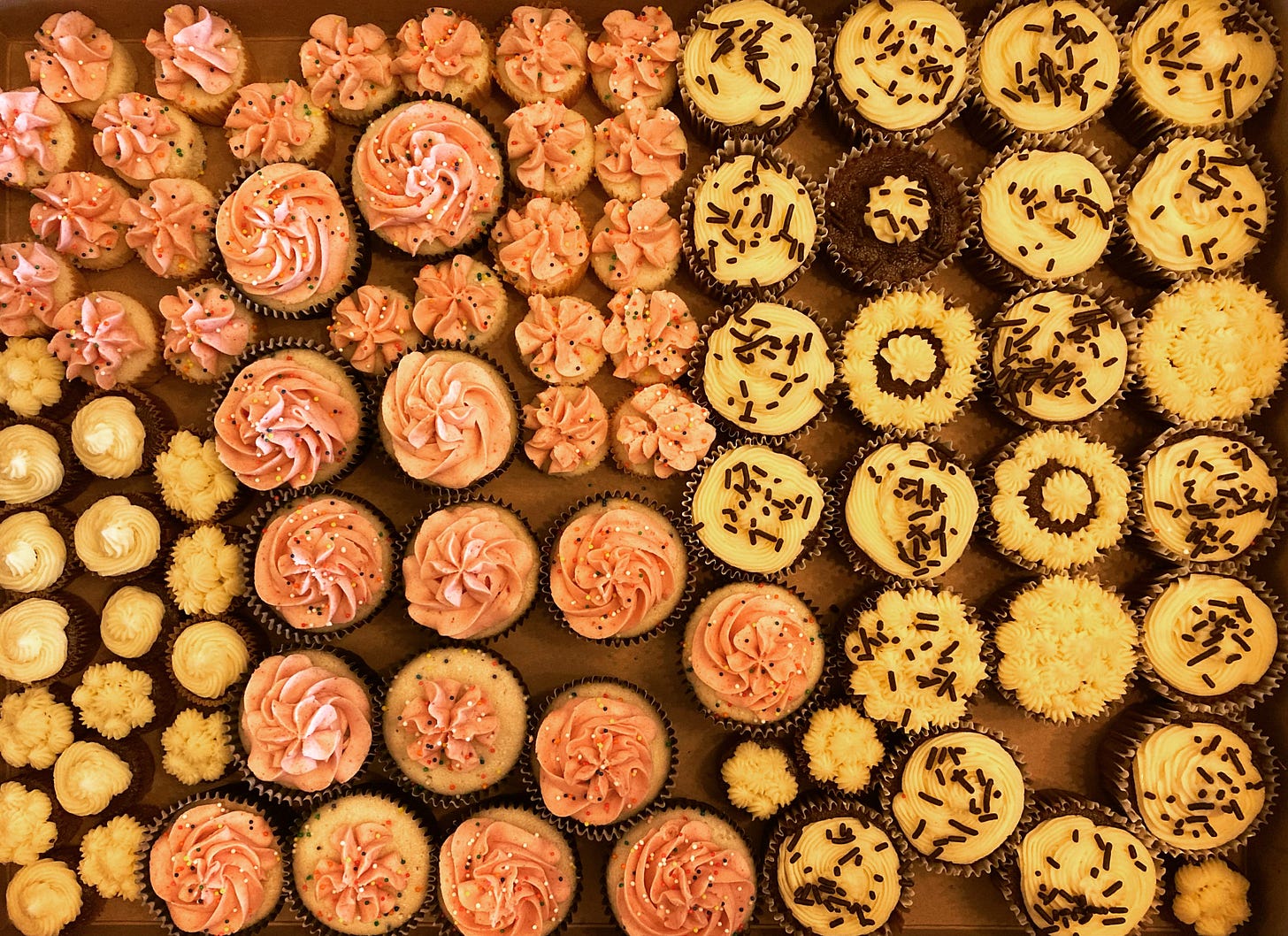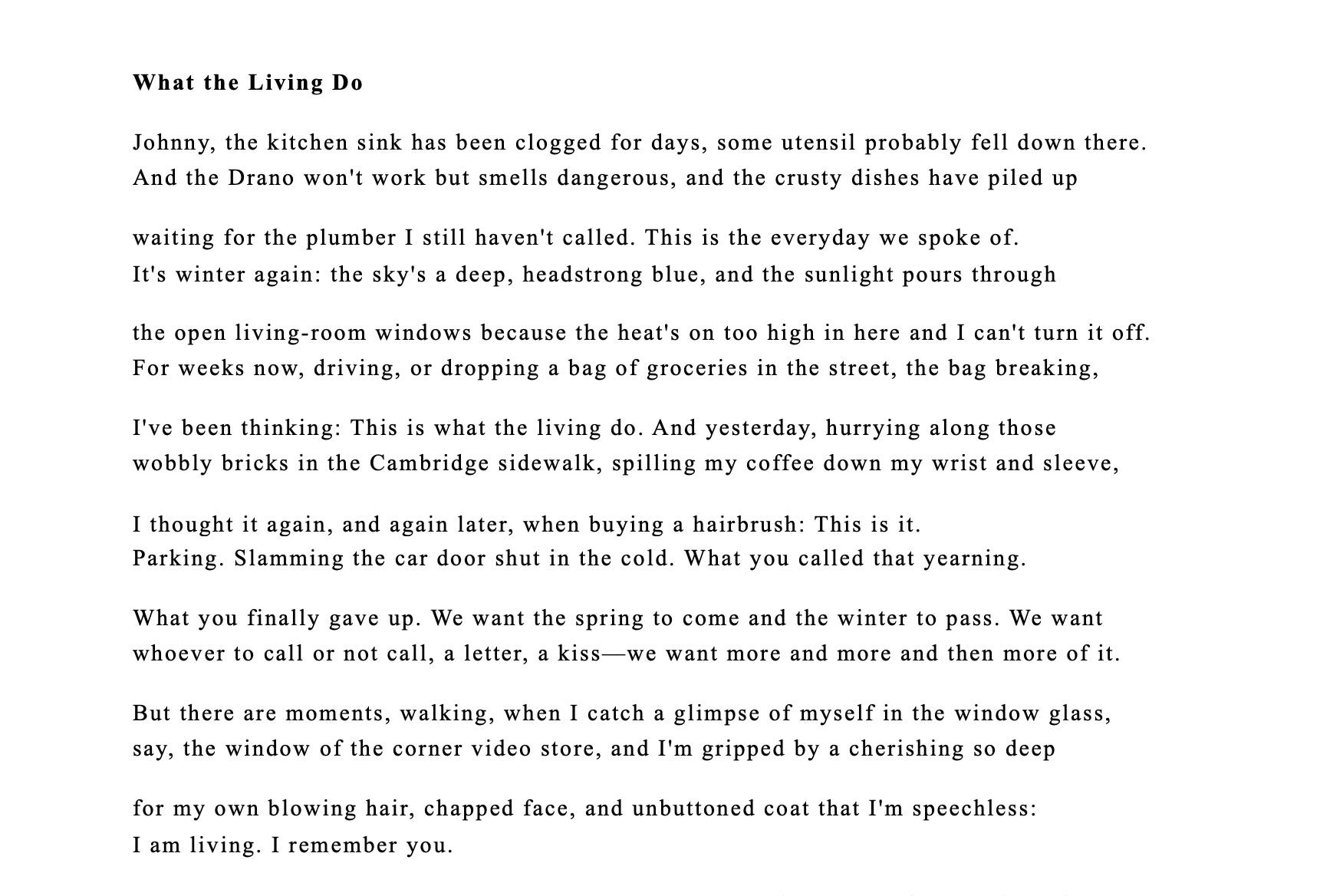
Hello, again, dear readers and writers. I’m back after a short break, and still digging myself out of the shock of grief and loss. I seem to be in touch with anger now, more than anything (one of the stages of loss, according to Elizabeth Kübler-Ross). This has sparked moments of great cynicism, mostly about the ways we deny ourselves pleasure while trying to maintain our health (and stay alive). So this week’s virtual writing workshop addresses sarcasm and cynicism head on.
These feelings, this cynicism, is part of what the living do, as Marie Howe writes so beautifully in this week’s closing poem. And as anyone who has lost a loved one knows, death reminds us to live our lives fully, and we must take on this responsibility again and again. James Baldwin says it best in this week’s quote from his epic work of non-fiction, The Fire Next Time, which he wrote to his nephew:
It seems to me that one ought to rejoice in the fact of death—ought to decide, indeed, to earn one's death by confronting with passion the conundrum of life. One is responsible to life: It is the small beacon in that terrifying darkness from which we come and to which we shall return. One must negotiate this passage as nobly as possible, for the sake of those who are coming after us.
The prompt this week is David Allen Sullivan’s poem, “Warnings,” which may have you vacillating between laughing out loud, admiring his clever snarkiness, and thinking deeply about the absurdity, sadness, and beauty of life. As always with a poem as a prompt, allow the tone of the poem to guide you into a free write, or choose a few lines from the poem as a place to begin. Write for 20 minutes without stopping, without making any corrections, and without judging what comes out. (This is a difficult practice!).
You can find Sullivan’s poem below, followed by what I wrote.
Howe’s beautiful poem comes at the very end.
(Note: the formatting for both poems will be altered on your phone, and in the email version as well. To see the poems as they were intended to be formatted, read the rest of this post on my Substack here.)
Warnings
by David Allen Sullivan
A can of self-defense pepper spray says it may
irritate the eyes, while a bathroom heater says it's
not to be used in bathrooms. I collect warnings
the way I used to collect philosophy quotes.
Wittgenstein's There's no such thing
as clear milk rubs shoulders with a box
of rat poison which has been found
to cause cancer in laboratory mice.
Levinas' Language is a battering ram—
a sign that says the very fact of saying,
is as inscrutable as the laser pointer's advice:
Do not look into laser with remaining eye.
Last week I boxed up the solemn row
of philosophy tomes and carted them down
to the used bookstore. The dolly read:
Not to be used to transport humans.
Did lawyers insist that the 13-inch wheel
on the wheelbarrow proclaim it's
not intended for highway use? Or that the
Curling iron is for external use only?
Abram says that realists render material
to give the reader the illusion of the ordinary.
What would he make of Shin pads cannot protect
any part of the body they do not cover?
I load boxes of books onto the counter. Flip
to a yellow-highlighted passage in Aristotle:
Whiteness which lasts for a long time is no whiter
than whiteness which lasts only a day.
A.A.'ers talk about the blinding glare
of the obvious: Objects in the mirror
are actually behind you, Electric cattle prod
only to be used on animals, Warning: Knives are sharp.
What would I have done without: Remove infant
before folding for storage, Do not use hair dryer
while sleeping, Eating pet rocks may lead to broken
teeth, Do not use deodorant intimately?
Goodbye to all those sentences that sought
to puncture the illusory world—like the warning
on the polyester Halloween outfit for my son:
Batman costume will not enable you to fly.
What I wrote in response:
I've been feeling cynical about anti-inflammatory foods lately. How can eating berries every day be the best way to go, when berries are only in season maybe six months out of the year? Instead of eating with the seasons, I'm emptying plastic bags of frozen fruit into my blender for a morning shake. This can't be good for the environment. What did people do before they could buy frozen bags of berries? They froze fresh fruit, I guess. And before they had freezers? They ate fresh fruit when it was in season.
One article I read states that coffee is inflammatory, another says it reduces inflammation. Still another says medium roasts are the only way to access the anti-inflammatory effects. Real cream is a no no, so I spend $7 on the one nondairy oat creamer I can stand, and pour about a 1/4 cup into my coffee. Is the fat in my creamer the "good fat," that’s found in avocados and coconut oil? Maybe. Or maybe that's all bullshit. Canola oil is supposed to be lousy for hyperactive immune systems, but my apple cake comes out dry and flat without it, so I bought it today in a plastic bottle and just said, Fuck it.
"What is inflammation, really?" my dear and deceased friend Nina asked me once, and we went on yet another intellectual journey together. This one involved a $15 National Geographic special edition that described t-cells and interleukin 1 and 2 and cytokines and lymphocytes and red blood cells (those last two were the only ones we really understood). The immune system creates inflammation when it responds to an antigen, an invader; fluid swells an infected sinus cavity, or an injured knee. The problem seems to be when the body is in a chronic inflammatory state, that's when cancer and other illnesses develop. The immune system is either evaded (as with HIV) or goes wild (as with Covid). And anti-inflammatory diets are supposed to help.
But do they, really? Books have been written, articles published and reviewed. Peers scowl over manuscripts in competition with their fellow scholars, but did not eating sugar for nearly five years save Nina's life? Did it extend it? Who the fuck knows? But she felt deprived: a lot. And I have messed up more than one dessert because I added an amber honey this time or 1/4 cup more coconut oil instead of butter, which, let's face it, is really what makes everything taste good, savory or sweet. Try cooking mushrooms—touted as a miracle food in the anti-inflammatory world, BTW—try cooking them in butter vs. olive oil, and watch everyone say how delicious they are. Spread butter on warm sourdough toast (also supposedly better for you), and each crunchy bite is like a piece of cake.
I know I feel lousy when I eat a lot of sugar and wheat, when I drink wine every night for a few nights in a row. But there has to be some balance between eating well, eating an anti-inflammatory diet, and enjoying the pleasure of food. Sure, that gluten free panko fried tofu patty is juicy and crunchy, but almost everyone would prefer the fried chicken sandwich on brioche much more. It might be killing you softly, this deep fried luscious thing with tartar sauce, but you're going to die anyway, right? That sucks, but not as bad as years of deprivation and false hope. You can enjoy the whipped frozen banana all you want, but at some point, you just have to get a scoop of gelato and deal with the consequences.
This final poem is by Marie Howe, from her collection of the same name: What the Living Do. In order to preserve the formatting, I had to post it as an image. This may look tiny on your phone or in the email, so read it on my Substack here.





Beautiful, Chris... I love your posts, especially about baking, and this one about grief and anger and Nina resonates so deeply with me... not least the lines: "...did not eating sugar for nearly five years save Nina's life? Did it extend it? Who the fuck knows? But she felt deprived: a lot." Thank you, dear man, fine writer... you are a treasure.
Amen, sister! LONG LIVE BUTTER, and long live our happy tastebuds! xoxo